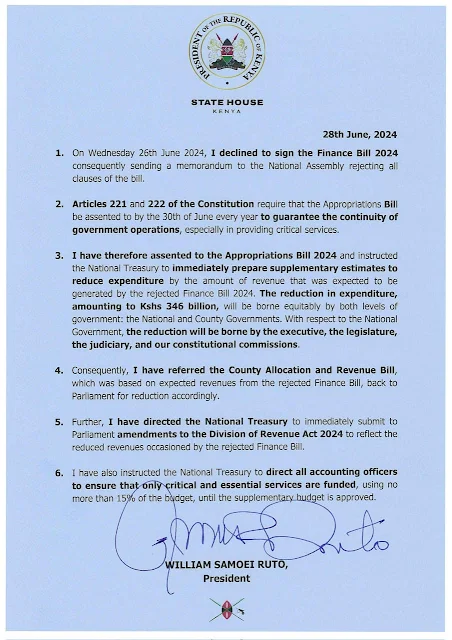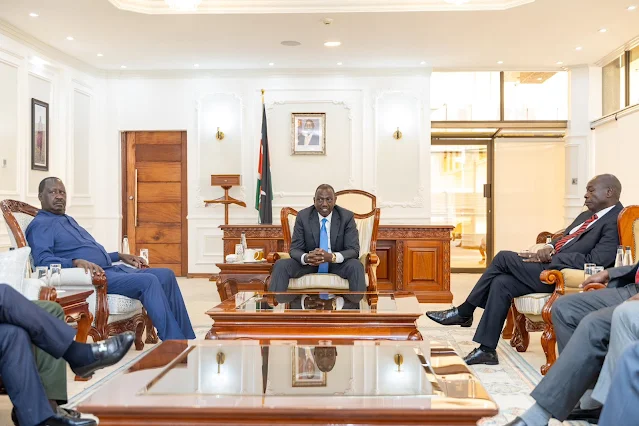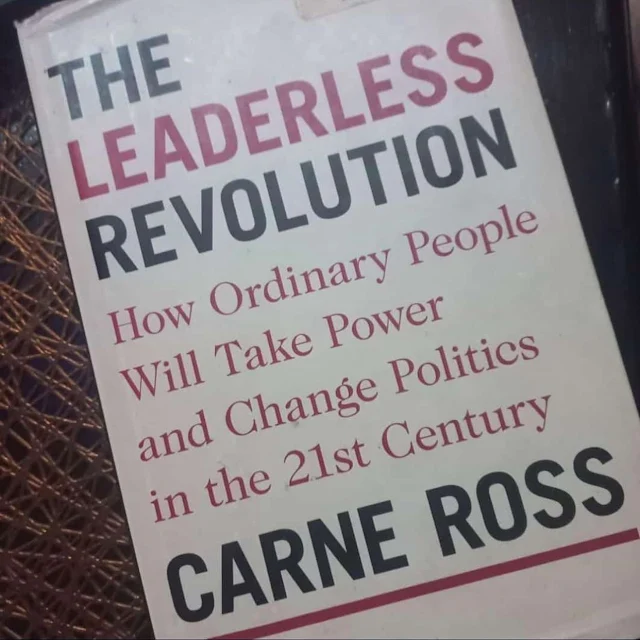
President William Ruto’s recent political manoeuvres have left the youth and much of the Kenyan public outraged and disillusioned.
Finance Bill vs Appropriation Bill: A Tactical Diversion
To understand the gravity of this political bait-and-switch, it's essential to differentiate between the Finance Bill and the Appropriation Bill.
The Finance Bill deals with how the government plans to raise revenue, primarily through taxation. In contrast, the Appropriation Bill outlines the government’s spending plans. By publicly rejecting the Finance Bill, Ruto created a smokescreen, diverting attention from the Appropriation Bill, which he signed into law. This strategic distraction allowed him to proceed with his spending plans unchecked, rendering any promised budget cuts or fiscal reforms meaningless.
The Deceptive Strategy: Misdirection and ManipulationRuto’s calculated announcements and actions are no coincidence. By focussing public discourse on the Finance Bill, Ruto diverted attention from the more consequential Appropriation Bill.
Implications of the Appropriation Bill 2024The Appropriation Bill 2024, now a law, dictates how the government will allocate funds across various sectors. Despite public outcry for budget cuts, the bill’s passage means that even the proposed reductions to discretionary spending require a complex legislative process to amend or repeal. Ruto’s promises of fiscal restraint are exposed as empty rhetoric, given the legal reality of the bill.
Betrayal of Gen Z and the Broader PublicGen Z protesters, who have been vocal in their opposition to the government’s policies, feel particularly aggrieved. Their leaderless movement now faces the challenge of addressing the real issue: the already-approved spending measures. This sense of betrayal has only intensified their resolve, as evidenced by their recent statements and continued activism. Media and Politicians: Complicity and Silence Mainstream media and politicians have played a complicit role in this affair, downplaying or ignoring the significance of the Appropriation Bill. This deliberate obfuscation has kept the public in the dark, preventing a broader understanding of the real issues at play. It is evident that many media outlets and political figures have been incentivised to conceal the truth, maintaining a status quo that benefits the ruling administration.
Moving Forward: Strategies for Genuine Change Despite the challenges, there are several strategies for achieving genuine change:
1. Sustained Public Pressure: Continuous and organised public pressure through protests and social media campaigns can keep the issue in the spotlight and force the government to address it.
2. Parliamentary Action: Pushing for amendments to the Appropriation Bill through supplementary budgets or legislative changes is essential, despite the difficulty. This requires rallying support from MPs who are not under the administration’s influence.
3. Increased Awareness and Education: Educating the public about the budgeting process and the implications of both the Finance and Appropriation Bills can empower more citizens to engage in informed activism.
4. Coalition Building: Forming alliances with civil society organisations, professional groups, and other stakeholders can amplify the voices of the youth and create a united front against government excesses.
5. Electoral Accountability: Mobilising voters, especially the youth, to participate actively in elections, and mass recalls in particular, now that the IEBC is fully constituted, and voting for leaders who genuinely represent their interests is crucial for holding the government accountable.The Road Ahead President William Ruto’s recent actions have laid bare the deceptive nature of his administration. The signing of the Appropriation Bill 2024, despite the rejection of the Finance Bill, is a clear indication of the government’s intent to continue its spending spree without regard for the public’s concerns.As Gen Z and other Kenyans grapple with this betrayal, the need for sustained activism and informed engagement becomes ever more critical. The battle for Kenya’s future is far from over, and the youth’s resilience and determination will be pivotal in shaping the nation’s path forward.

.jpeg)












Comments